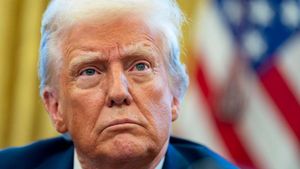BRUSSELS - French President Emmanuel Macron has made significant statements emphasizing the pressing need for Europe to strengthen its economic independence and unity, particularly following recent threats from the United States concerning potential trade attacks.
During informal discussions with EU leaders, Macron highlighted the importance of Europe commanding respect on the global stage when faced with external challenges. He warned, "Europe must make itself respected by responding to external challenges," urging for collective action against what he termed "attacks" on commercial interests.
This push for solidarity is underpinned by the recent stance taken by U.S. President Donald Trump’s administration, which has proposed new tariffs affecting European goods. Reflecting on this, Macron stated, "Just as COVID-19 and Russian aggression in Ukraine have become wake-up calls for Europe, recent U.S. statements are urging the EU to act more collectively." The French President's comments come at a time when tensions between the EU and the U.S. are increasingly pronounced.
Macron's vision for Europe involves prioritizing the "preferential purchase" of European-made weapons and fostering greater independence from U.S. military supplies. He reiterated this point at the defense meeting, stating, "When we decide to buy, let's choose European. That way we will be more independent, it's simple". By shifting focus toward homegrown production, Macron believes European nations can bolster their defense capabilities and reduce reliance on external powers.
The discussion wasn't limited to trade, as Macron also urged strengthened investments across the European defense industry, advocating for both public and private funding to address security challenges facing the continent. He announced plans to remove military spending from the restrictive rules outlined within the European Stability and Growth Pact to facilitate this funding.
Germany's Chancellor Olaf Scholz echoed Macron's sentiments, indicating strong advocacy for retaliatory tariffs should the U.S. impose its proposed duties on European goods. The EU has demonstrated readiness to take collective action, with various leaders advocating for the region's need to present a united front over trade issues.
Notably, Macron's call for increased military expenditure has garnered support from nineteen EU nations, including France, Germany, Italy, and Spain. These countries have urged the European Investment Bank (EIB) to develop mechanisms to fund rearmament and equipment, which currently falls outside the bank’s purview of financing arms production or military-related activities. Macron's administration is pushing for reforms to facilitate funding needed to achieve greater autonomy.
The political environment surrounding Europe’s response to the U.S. is becoming increasingly complex. Macron suggests the shifting U.S. political climate, particularly under Trump’s leadership, is amplifying long-standing European calls for greater unity and self-reliance. Throughout his addresses, he emphasizes how Europe cannot afford to let external pressures dictate its economic and military futures.
By framing these developments as part of Europe's broader need for collective security, Macron's overall strategy reflects significant shifts within EU policies as they respond to external economic threats. Concerns over global trade dynamics, coupled with regional security issues, are motivating EU nations to act decisively.
Looking forward, the approach advocated by Macron marks pivotal changes not only for individual nations within the EU but also for the bloc's overall strategic posture. The collective decisions made now may set the course for how Europe engages with the rest of the world, particularly with respect to complex relationships with powerful nations like the United States.
Macron's statements have already ignited discussions among leaders, reflecting the urgency with which Europe must meet these challenges head-on. The outcome of this informal meeting, coupled with forthcoming EU responses, will undoubtedly influence the organization’s economic strength and international respect moving forward.
With the winds of change sweeping across the transatlantic relations, it seems Europe acknowledges the need for unity against potential 'attacks' and the necessity of crafting its path toward economic independence.



